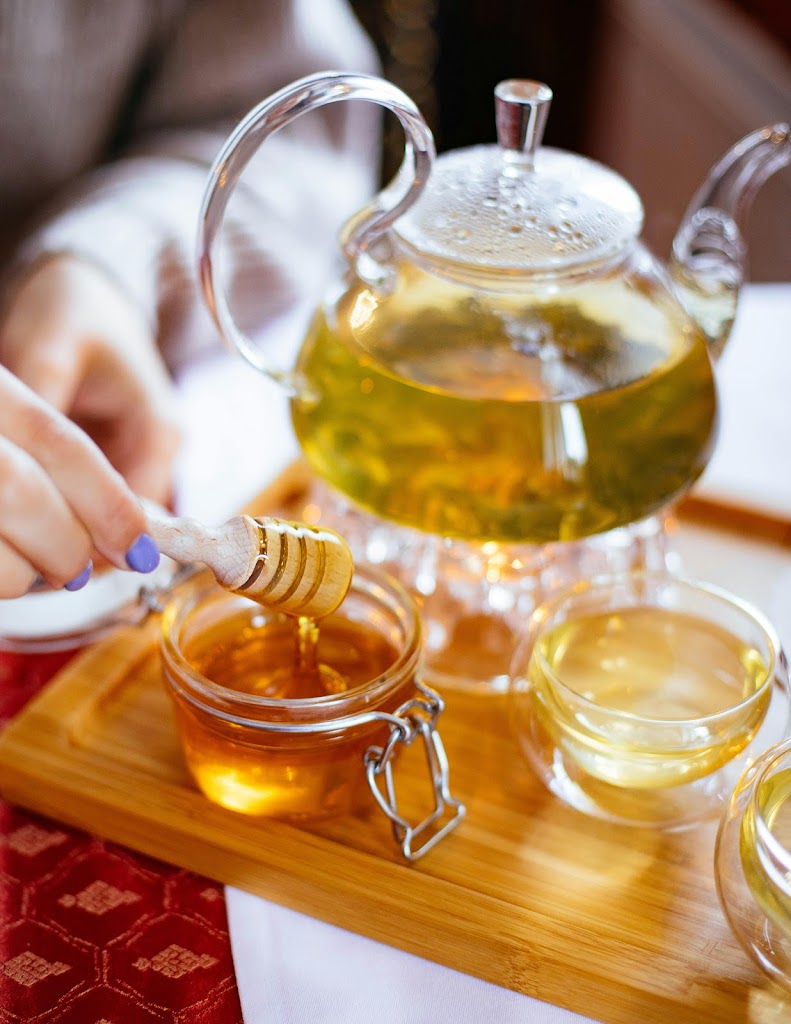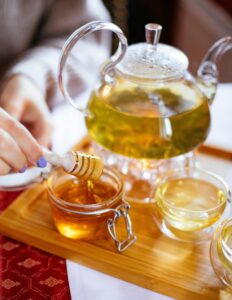Hormone imbalance can significantly affect an individual’s health and well-being. Hormones are crucial chemical messengers in the body that regulate various physiological processes, including metabolism, growth, reproduction, and mood. When these hormones are out of balance, it can lead to a range of symptoms and health issues. While conventional treatments are available, many people seek natural remedies to avoid potential side effects. Herbal teas have gained popularity as a natural, effective way to help balance hormones. In this article, we will explore the best herbal teas for hormone imbalance, their benefits, and how to incorporate them into your daily routine.
Understanding Hormone Imbalance
What Are Hormones?
Hormones are chemical substances produced by glands in the endocrine system. They travel through the bloodstream to tissues and organs, delivering messages that regulate bodily functions. Key hormones include estrogen, progesterone, testosterone, cortisol, insulin, and thyroid hormones, among others.
Common Types of Hormone Imbalances
- Estrogen Dominance: Excess estrogen relative to progesterone.
- Low Testosterone: Insufficient testosterone levels in men and women.
- Thyroid Disorders: Imbalances in thyroid hormones (e.g., hypothyroidism, hyperthyroidism).
- Adrenal Fatigue: Dysregulation of cortisol production.
- Insulin Resistance: Inefficient use of insulin by the body.
Symptoms of Hormone Imbalance
- Irregular menstrual cycles
- Weight gain or loss
- Fatigue
- Mood swings and depression
- Insomnia
- Hair loss
- Acne
- Reduced libido
Causes and Risk Factors
- Poor diet
- Stress
- Lack of exercise
- Environmental toxins
- Chronic illnesses
- Genetic predisposition
- Aging
Benefits of Herbal Teas for Hormone Imbalance
Natural Treatment Option
Herbal teas offer a natural way to help balance hormones without the use of synthetic medications. They contain phytoestrogens, antioxidants, and other compounds that can positively affect hormonal health.
Fewer Side Effects Compared to Medication
Unlike some medications, herbal teas typically have fewer side effects when consumed in moderation. This makes them an appealing option for those looking to avoid the adverse effects associated with conventional hormone treatments.
Overall Health Benefits
In addition to their hormone-balancing properties, herbal teas provide numerous health benefits. They can improve digestion, reduce inflammation, enhance sleep, and boost the immune system.
Types of Herbal Teas for Hormone Imbalance
Chamomile Tea
Benefits
- Promotes relaxation and improves sleep quality
- Eases menstrual cramps and pain
Preparation
- Steep 1-2 teaspoons of dried chamomile flowers in hot water for 5-10 minutes.
- Strain and enjoy.
Peppermint Tea
Benefits
- Reduces testosterone levels in women with hirsutism
- Aids digestion and reduces bloating
Preparation
- Steep fresh or dried peppermint leaves in boiling water for 5-7 minutes.
- Strain and drink.
Green Tea
Benefits
- Balances insulin levels, aiding in the management of diabetes
- Supports weight loss and boosts metabolism
Preparation
- Steep green tea leaves in hot (not boiling) water for 2-3 minutes.
- Strain and serve.
Ginger Tea
Benefits
- Reduces inflammation and pain
- Helps alleviate nausea and digestive issues
Preparation
- Slice fresh ginger root and boil in water for 10-15 minutes.
- Strain and add honey or lemon for flavor.
Raspberry Leaf Tea
Benefits
- Strengthens the uterine walls, beneficial for menstrual health
- Reduces PMS symptoms
Preparation
- Steep 1-2 teaspoons of dried raspberry leaves in hot water for 10 minutes.
- Strain and drink.
Chasteberry Tea
Benefits
- Regulates menstrual cycles
- Reduces symptoms of PMS and menopause
Preparation
- Steep chasteberry (vitex) berries in boiling water for 10-15 minutes.
- Strain and enjoy.
Ashwagandha Tea
Benefits
- Balances cortisol levels, reducing stress
- Enhances energy and stamina
Preparation
- Boil ashwagandha root powder in water for 10 minutes.
- Strain and drink.
Maca Root Tea
Benefits
- Enhances libido and sexual function
- Supports adrenal health
Preparation
- Mix maca root powder in hot water until dissolved.
- Drink warm.
Licorice Root Tea
Benefits
- Supports adrenal gland function
- Balances estrogen levels
Preparation
- Boil licorice root in water for 10-15 minutes.
- Strain and serve.
Turmeric Tea
Benefits
- Reduces inflammation
- Supports liver detoxification
Preparation
- Simmer turmeric root or powder in water for 10 minutes.
- Strain and add honey or lemon.
Detailed Benefits of Key Herbal Teas
Chamomile Tea
Reduces Stress and Promotes Sleep
Chamomile tea is renowned for its calming properties. It contains apigenin, an antioxidant that binds to certain receptors in the brain, promoting relaxation and sleep. Regular consumption can help reduce stress levels, which is crucial for maintaining hormonal balance.
Eases Menstrual Pain
The anti-inflammatory and antispasmodic properties of chamomile tea can help alleviate menstrual cramps. Drinking chamomile tea during your menstrual cycle can reduce pain and discomfort, making it easier to manage hormone-related symptoms.
Peppermint Tea
Reduces Testosterone Levels
Peppermint tea has been shown to reduce testosterone levels in women, making it beneficial for those with hirsutism (excess hair growth). It can help balance hormones naturally without the need for medication.
Improves Digestion
Peppermint tea aids digestion by relaxing the muscles of the gastrointestinal tract. This can reduce bloating, gas, and other digestive issues, contributing to overall well-being and hormonal health.
Green Tea
Balances Insulin Levels
Green tea is rich in catechins, which help regulate insulin and glucose levels. This can be particularly beneficial for individuals with insulin resistance or type 2 diabetes, conditions often associated with hormonal imbalances.
Supports Weight Loss
Green tea boosts metabolism and promotes fat burning, aiding in weight management. Maintaining a healthy weight is important for hormone balance, as excess body fat can lead to estrogen dominance and other hormonal issues.
Ginger Tea
Reduces Inflammation
Ginger contains gingerol, a powerful anti-inflammatory compound. Regular consumption of ginger tea can help reduce inflammation, which is linked to hormonal imbalances and various health issues.
Alleviates Nausea
Ginger tea is effective in relieving nausea and digestive discomfort. It can be particularly helpful for women experiencing nausea during pregnancy, a time when hormonal fluctuations are common.
Raspberry Leaf Tea
Strengthens Uterine Walls
Raspberry leaf tea is known for its ability to strengthen the uterine walls, making it beneficial for menstrual health and pregnancy. It can help regulate menstrual cycles and reduce heavy bleeding.
Eases PMS Symptoms
The antispasmodic properties of raspberry leaf tea can alleviate PMS symptoms such as cramps, bloating, and mood swings. Regular consumption can promote overall hormonal balance.
Chasteberry Tea
Regulates Menstrual Cycles
Chasteberry, also known as vitex, is commonly used to regulate menstrual cycles and alleviate symptoms of PMS and menopause. It works by influencing the pituitary gland to balance hormone levels.
Reduces PMS and Menopause Symptoms
Chasteberry tea can reduce symptoms such as breast tenderness, mood swings, and hot flashes. It is a natural alternative to hormone replacement therapy for many women.
Ashwagandha Tea
Balances Cortisol Levels
Ashwagandha is an adaptogenic herb that helps the body manage stress by balancing cortisol levels. Lowering cortisol can reduce the impact of stress on the body, supporting overall hormonal health.
Reduces Anxiety and Stress
Ashwagandha tea can help reduce anxiety and promote a sense of calm. Its adaptogenic properties make it effective in managing stress-related hormonal imbalances.
Maca Root Tea
Enhances Libido
Maca root is known for its ability to enhance libido and sexual function. It can help balance sex hormones and improve reproductive health.
Supports Adrenal Function
Maca root supports adrenal health by regulating cortisol production. This can improve energy levels and reduce fatigue, contributing to better hormonal balance.
Licorice Root Tea
Supports Adrenal Health
Licorice root helps support adrenal gland function, which is crucial for hormone production and balance. It can help manage stress and reduce symptoms of adrenal fatigue.
Balances Estrogen Levels
Licorice root contains phytoestrogens that can help balance estrogen levels in the body. This can be beneficial for women experiencing estrogen dominance or menopause symptoms.
Turmeric Tea
Reduces Inflammation
Turmeric contains curcumin, a powerful anti-inflammatory compound. Regular consumption of turmeric tea can help reduce inflammation and support overall health.
Supports Liver Function
Turmeric tea supports liver detoxification, which is essential for hormone metabolism. A healthy liver can more effectively process and eliminate excess hormones, contributing to hormonal balance.
How to Incorporate Herbal Teas into Your Daily Routine
Best Times to Drink Herbal Teas
- Morning: Start your day with energizing teas like green tea or maca root tea.
- Afternoon: Enjoy digestive teas like peppermint or ginger tea after meals.
- Evening: Wind down with calming teas like chamomile or ashwagandha tea.
How Much to Consume Daily
- Generally, 2-3 cups of herbal tea per day is sufficient to reap the benefits without overconsumption.
Pairing Herbal Teas with Other Healthy Habits
- Combine herbal tea consumption with a balanced diet, regular exercise, and adequate sleep for optimal hormonal health.
Potential Side Effects and Precautions
Possible Side Effects of Herbal Teas
- Some herbal teas can cause allergic reactions or interact with medications. Always start with small amounts to test your tolerance.
Who Should Avoid Certain Herbal Teas
- Pregnant or breastfeeding women should consult a healthcare provider before consuming certain herbal teas.
- Individuals with specific health conditions or those taking medications should seek medical advice.
Consulting with a Healthcare Provider
- Always consult with a healthcare provider before starting any new herbal regimen, especially if you have underlying health conditions or are taking medications.
Success Stories and Testimonials
Real-Life Stories of People Who Benefited from Herbal Teas
- Personal accounts of individuals who have experienced positive changes in their hormone balance through herbal teas.
Testimonials from Health Experts
- Insights and recommendations from nutritionists and herbalists on the benefits of herbal teas for hormone balance.
Expert Insights
Quotes and Advice from Nutritionists and Herbalists
- “Herbal teas can be a gentle yet effective way to support hormonal health. Consistency is key.” – Dr. Jane Doe, Nutritionist
Research Findings on Herbal Teas and Hormone Balance
- Summaries of scientific studies supporting the use of herbal teas for hormone balance.
Conclusion
Summary of Key Points
- Herbal teas offer a natural and effective way to help balance hormones.
- Different types of herbal teas provide various benefits, from reducing stress to supporting reproductive health.
- Incorporating herbal teas into your daily routine can improve overall well-being.
Encouragement to Try Herbal Teas
- Experiment with different herbal teas to find what works best for you.
- Combine tea consumption with other healthy lifestyle practices.
Call to Action for Further Research and Consultation with Healthcare Providers
- Always seek professional advice before starting a new herbal regimen.
- Continue researching and learning about natural ways to support hormonal health.
FAQs
What Are the Best Herbal Teas for Hormone Imbalance?
- Chamomile, peppermint, green tea, ginger, raspberry leaf, chasteberry, ashwagandha, maca root, licorice root, and turmeric are among the best options.
How Quickly Can Herbal Teas Affect Hormone Levels?
- The effects can vary, but consistent use over several weeks is often needed to see significant changes.
Can Men Also Benefit from Herbal Teas for Hormone Imbalance?
- Yes, men can benefit from herbal teas like licorice root and maca root to support testosterone and overall hormonal health.
Are There Any Interactions Between Herbal Teas and Medications?
- Some herbal teas can interact with medications. It’s important to consult with a healthcare provider before combining them.
How Should I Store Herbal Teas?
- Store herbal teas in a cool, dry place away from direct sunlight to preserve their potency and freshness.




